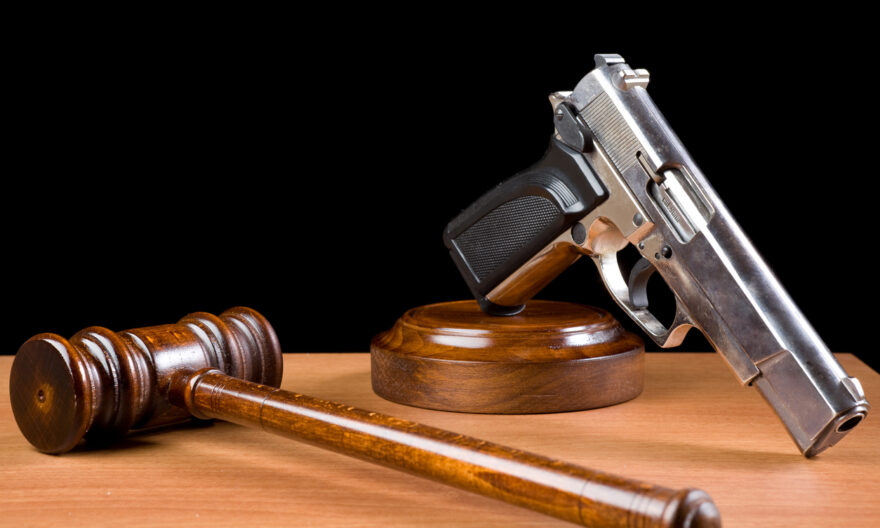
A federal appeals court has recently delivered a ruling stating that an individual who committed a nonviolent offense cannot be legally prohibited from owning a firearm.
This decision has the potential to pose a setback to gun regulations, which were influenced by a Supreme Court ruling last year that significantly expanded the right to bear arms.
In a majority ruling of 11 to 4, the U.S. Court of Appeals for the Third Circuit in Philadelphia overturned previous court decisions against Bryan Range, a resident of Pennsylvania.
Range had filed a lawsuit against the state after being denied the purchase of a shotgun due to a conviction for providing false information on a benefits application in the 1990s.
Judge Thomas M. Hardiman, in the majority opinion, frequently referenced a Supreme Court ruling from last June written by Justice Clarence Thomas. This ruling established a new standard, whereby gun laws must adhere to the “historical tradition” dating back to the 18th and 19th centuries.
“In essence, we disagree with the government’s argument that the protection of the Second Amendment only extends to ‘law-abiding, responsible citizens,'” wrote Judge Hardiman, who was appointed by President George W. Bush and was considered as a potential Supreme Court nominee by President Donald J. Trump following the death of Justice Antonin Scalia in 2016.
It remains uncertain whether this ruling will be applicable to similar cases involving individuals with minor criminal records, or if it will have broader implications. Michael P. Gottlieb, the attorney representing Mr. Range, stated that he pursued this case solely for the benefit of his client and expressed the belief that it could potentially reach the Supreme Court if the Justice Department decides to appeal, which he views as unwise.
At the time of this response, there has been no immediate response from the Justice Department spokesperson regarding a comment on the matter.
The judges who ruled in favor of Mr. Range attempted to downplay the significance of the decision.
Judge Hardiman clarified that his opinion was narrow, applying only to cases involving nonviolent criminal convictions carrying substantial potential prison terms. Three concurring judges emphasized that the ruling does not signify the end of a specific section of federal law that restricts gun ownership for individuals “convicted in any court of a crime punishable by imprisonment for a term exceeding one year.”
Eric Tirschwell, the executive director of Everytown Law, a gun control organization that supported the lifetime gun ban for Mr. Range, also expressed the belief that the impact of the decision would likely be limited. He cited a recent opposing ruling by the U.S. Court of Appeals for the Eighth Circuit in St. Louis, which reaffirmed the government’s authority to prohibit convicted felons from owning guns.
“We anticipate that the vast majority of individuals convicted of felonies will still be prohibited from possessing firearms, as another federal appeals court ruled just days ago,” Tirschwell stated.
However, Judge Patty Shwartz, an appointee of President Obama to the Third Circuit, expressed strong disagreement in her dissenting opinion and warned that the majority’s ruling would establish a broad and potentially dangerous precedent.
Despite the majority’s claim that their opinion is limited in scope, Judge Shwartz argued that the analytical framework employed in reaching their conclusion could render most, if not all, restrictions on felons’ gun ownership unconstitutional.
Regardless of the potential impact of the ruling, Judge Hardiman’s opinion directly addressed fundamental issues raised in the Supreme Court’s decision from last June, using expansive language that hinted at a gradual erosion of the constitutional basis for many gun laws.
Judge Hardiman emphasized that punishing Mr. Range by stripping him of his gun rights for a non-violent offense grants lawmakers excessive power to manipulate the Second Amendment. This approach allows individuals like Mr. Range, who lead otherwise law-abiding lives, to be labeled as criminals, which Judge Hardiman deemed problematic.
Federal laws prohibit individuals convicted of state or federal crimes that carry a prison sentence exceeding one year from purchasing firearms. In certain states like Pennsylvania, this ban applies even to misdemeanors that have a potential sentence of at least one year. In the case of Mr. Range, his conviction for welfare fraud could have resulted in a maximum prison term of five years, but he was instead sentenced to probation.
Judge Hardiman further argued that the majority opinion in the New York State Rifle & Pistol Association v. Bruen case, authored by Justice Thomas, had effectively reversed the dynamic. According to the judge, the burden of proof no longer rests on Mr. Range to demonstrate why his gun rights should be restored; instead, it now falls on the government, which must justify its perceived infringement on an individual’s Second Amendment rights.
This case, closely monitored by national organizations representing opposing views on firearms, is the latest addition to a series of federal court rulings that chip away at existing gun regulations.
Among those eagerly anticipating the potential implications of Tuesday’s ruling are Hunter Biden and his legal representatives.
In light of ongoing investigations by the Justice Department into potential charges against Mr. Biden for allegedly providing false information regarding his drug use on a federal gun permit, his lawyers have reportedly conveyed to prosecutors that such prosecution could be rendered irrelevant by court decisions similar to the Range case.
Notably, the Range case was decided in the circuit court encompassing Delaware, which holds significance for Mr. Biden.
No comment was provided by Christopher Clark, one of Mr. Biden’s lawyers, in response to a request for comment.




